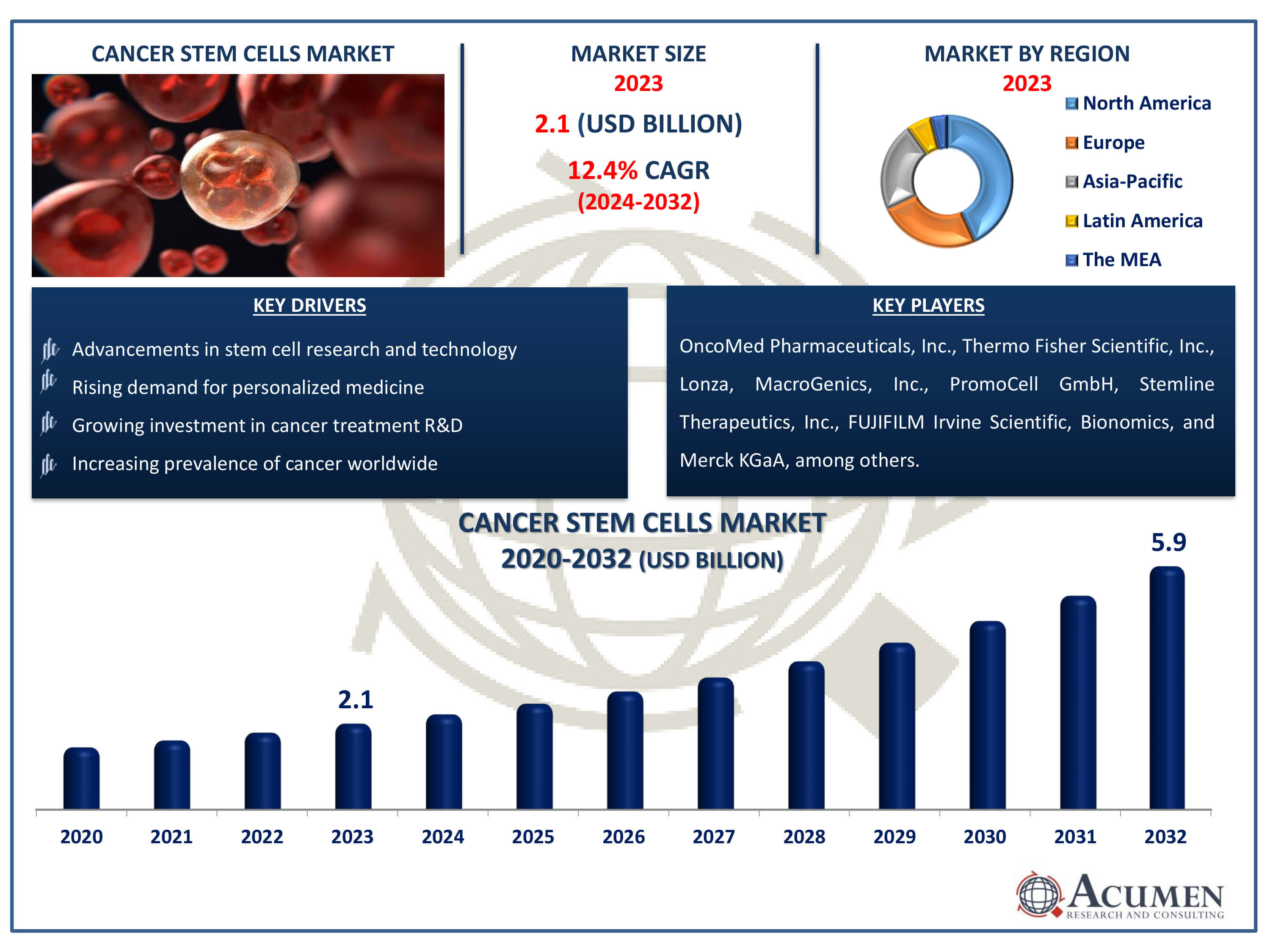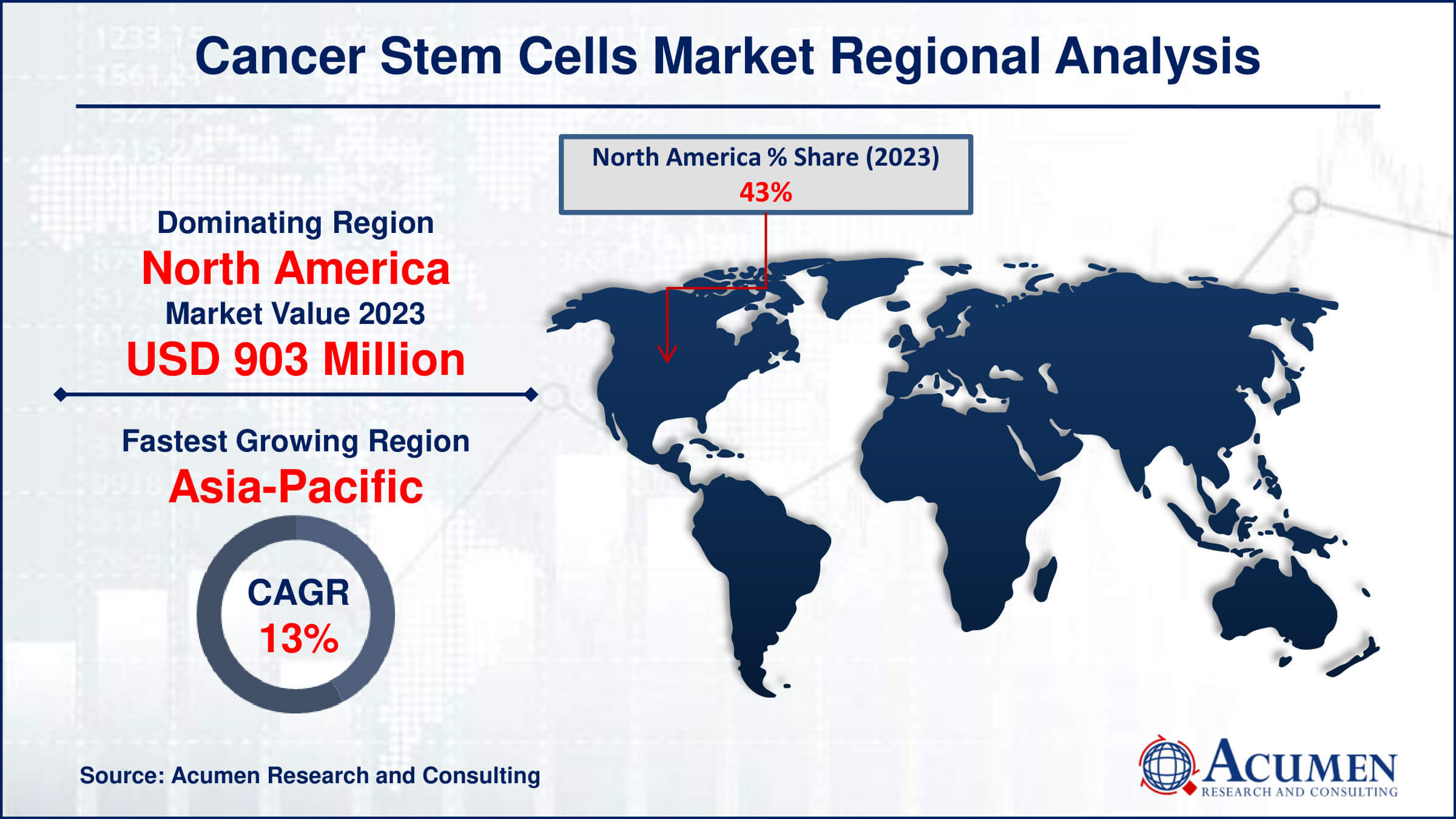Cancer Stem Cells Market | Acumen Research and Consulting
Cancer Stem Cells Market Size - Global Industry, Share, Analysis, Trends and Forecast 2024 - 2032
Published :
Report ID:
Pages :
Format :
The Cancer Stem Cells Market Size accounted for USD 2.1 Billion in 2023 and is estimated to achieve a market size of USD 5.9 Billion by 2032 growing at a CAGR of 12.4% from 2024 to 2032.
Cancer Stem Cells Market Highlights
- Global cancer stem cells market revenue is poised to garner USD 5.9 billion by 2032 with a CAGR of 12.4% from 2024 to 2032
- North America cancer stem cells market value occupied around USD 903 million in 2023
- Asia-Pacific cancer stem cells market growth will record a CAGR of more than 13% from 2024 to 2032
- Among type, the breast sub-segment generated more than USD 504 million revenue in 2023
- Based on end-user, the hospitals sub-segment generated significant cancer stem cells market share in 2023
- Increasing awareness and acceptance of stem cell treatments among patients is a popular cancer stem cells market trend that fuels the industry demand

Cancer is a condition associated with the uncontrollable growth of cells in the body. Over 100 types of cancer are observed in the human body. Stem cells are required for the maintenance of healthy tissue, where cells are continually being replaced. They are undifferentiated cells and thus have a significant application in the treatment of various diseases. A number of different types of treatment are used in the cure of cancer; however, stem cell therapy is expected to be one of the most prominent treatments with minimal side effects. Many major pharmaceutical and research organizations are trying to introduce new and advanced treatment options.
Global Cancer Stem Cells Market Dynamics
Market Drivers
- Increasing prevalence of cancer worldwide
- Advancements in stem cell research and technology
- Growing investment in cancer treatment R&D
- Rising demand for personalized medicine
Market Restraints
- High cost of stem cell therapies
- Ethical concerns related to stem cell research
- Regulatory hurdles and lengthy approval processes
Market Opportunities
- Development of targeted stem cell therapies
- Expanding applications of stem cells in oncology
- Collaboration between pharmaceutical companies and research institutions
Cancer Stem Cells Market Report Coverage
| Market | Cancer Stem Cells Market |
| Cancer Stem Cells Market Size 2022 | USD 2.1 Billion |
| Cancer Stem Cells Market Forecast 2032 | USD 5.9 Billion |
| Cancer Stem Cells Market CAGR During 2023 - 2032 | 12.4% |
| Cancer Stem Cells Market Analysis Period | 2020 - 2032 |
| Cancer Stem Cells Market Base Year |
2022 |
| Cancer Stem Cells Market Forecast Data | 2023 - 2032 |
| Segments Covered | By Type, By Application, By End-User, And By Geography |
| Regional Scope | North America, Europe, Asia Pacific, Latin America, and Middle East & Africa |
| Key Companies Profiled | OncoMed Pharmaceuticals, Inc., Thermo Fisher Scientific, Inc., Lonza, MacroGenics, Inc., PromoCell GmbH, Stemline Therapeutics, Inc., FUJIFILM Irvine Scientific, Bionomics, Merck KGaA, Miltenyi Biotec, and AbbVie, Inc. |
| Report Coverage |
Market Trends, Drivers, Restraints, Competitive Analysis, Player Profiling, Covid-19 Analysis, Regulation Analysis |
Cancer Stem Cells Market Insights
The global prevalence of cancer is increasing, making it a serious public health concern. This growth is mostly the result of aging populations, lifestyle changes, and environmental impacts. As the number of cancer cases increases, so does the demand for novel and effective treatments. Cancer stem cells (CSCs) have emerged as an attractive topic of study due to their involvement in tumor initiation, development, and resistance to conventional therapy. CSCs' ability to self-renew and specialize into distinct cell types makes them an important target for new cancer treatments. As a result, the rising prevalence of cancer is driving demand for enhanced CSC-based therapeutics, prompting increasing investment in research and development in this industry.
Despite their great potential, CSC medicines remain prohibitively expensive, preventing widespread adoption. Developing and developing stem cell-based medicines is a complex and expensive process that includes cell sourcing, genetic manipulation, and rigorous clinical testing. These costs are frequently passed on to patients, making these treatments less accessible to a larger population. Furthermore, the high cost may dissuade healthcare professionals and insurers from completely adopting these treatments, restricting their availability. Addressing this constraint necessitates continual efforts to streamline production processes, improve manufacturing efficiencies, and seek funds to subsidize costs, allowing more patients to benefit from these novel medications.
Understanding the biology of CSCs is improving, which opens up new avenues for generating tailored stem cell therapeutics. Unlike standard treatments, which may damage both healthy and malignant cells, targeted therapies seek to destroy CSCs only, potentially lowering adverse effects and enhancing treatment success. The capacity to target CSCs could lead to more effective and customized cancer treatments, in line with the emerging trend of precision medicine. Pharmaceutical companies and academic institutions are increasingly focusing on discovering specific markers and pathways linked to CSCs, paving the way for the development of novel, tailored medicines that potentially transform cancer treatment and improve patient outcomes.
Cancer Stem Cells Market Segmentation
The worldwide market for cancer stem cells is split based on type, application, end-user, and geography.
Cancer Stem Cells Types
- Brain
- Blood
- Pancreatic
- Lung
- Colorectal
- Bladder
- Liver
- Breast
- Others
According to cancer stem cells industry analysis, the breast cancer segment has the biggest market share. This significance is attributed to a variety of variables. For starters, breast cancer is one of the most frequent malignancies in the world, so effective therapies are in high demand. Identifying and targeting breast cancer stem cells (BCSCs) has shown significant promise for improving therapy outcomes. BCSCs are thought to play an important role in tumor recurrence and metastasis, making them a top priority for researchers. Advances in understanding BCSC biology have resulted in the development of targeted medicines aimed at eliminating these cells, lowering the risk of cancer recurrence and increasing patient survival rates. Furthermore, significant financing and research efforts focused on breast cancer have hastened the development and commercialization of CSC-based medicines, leading to the segment's market dominance.
Cancer Stem Cells Applications
- Stem Cell-Based Cancer Therapy
- Targeted Cancerous Stem Cells
The cancer stem cell market is divided into two segments depending on application: stem cell-based cancer therapy and targeted malignant stem cells. The stem cell-based cancer therapy segment has the highest market share and it is expected to grow over the cancer stem cells industry forecast period. This dominance stems from a growing realization of stem cell-based therapies' ability to provide more effective and less harmful therapeutic choices than conventional medicines. These medicines take advantage of stem cells' unique properties to restore damaged tissues and precisely target cancer cells. The increased expenditure in research and development, combined with advances in stem cell technology, has hastened the introduction of novel medicines in clinical settings. Furthermore, the growing pipeline of stem cell-based medicines in clinical trials emphasizes the segment's significant development potential and critical role in changing cancer therapy.
Cancer Stem Cells End-Users
- Hospitals
- Specialty Centres
- Other End-Users
Hospitals are expected to dominate owing to a variety of causes. Hospitals often have the advanced infrastructure and resources required to diagnose, treat, and conduct cancer stem cell research. They provide comprehensive care, such as surgery, chemotherapy, and radiation therapy, which are essential for treating cancer stem cell-related illnesses. Furthermore, hospitals frequently serve as major sites for clinical trials and research collaborations, encouraging improvements in treatment modalities and medications that target cancer stem cells. Their established networks with healthcare professionals, as well as access to patient groups, help them maintain market supremacy. As a result, hospitals are likely to maintain their dominance in the Cancer Stem Cells market, owing to their ability to combine cutting-edge technology and deliver holistic care solutions.
Cancer Stem Cells Market Regional Outlook
North America
- U.S.
- Canada
Europe
- U.K.
- Germany
- France
- Spain
- Rest of Europe
Asia-Pacific
- India
- Japan
- China
- Australia
- South Korea
- Rest of Asia-Pacific
Latin America
- Brazil
- Mexico
- Rest of Latin America
The Middle East & Africa
- South Africa
- GCC Countries
- Rest of the Middle East & Africa (ME&A)

Cancer Stem Cells Market Regional Analysis
In terms of cancer stem cells market analysis, North America emerges as a prominent leader in the global industry, driven by its significant prevalence of cancers such as lung, breast, and ovarian cancers. The region benefits from robust healthcare infrastructure, fostering advanced research and development activities. Key market players are heavily investing in innovative technologies and R&D initiatives to capitalize on the burgeoning demand.
In Europe, increasing government support and substantial healthcare investments propel the cancer stem cell market forward. Countries like France and Germany lead in healthcare expenditures and research, contributing to market growth. Asia Pacific stands out as the fastest-growing region during the cancer stem cells market forecast period, fueled by rising healthcare expenditures and a growing demand for specialized healthcare services. Latin America and the Middle East, including nations like Saudi Arabia, UAE, and Kuwait, are poised to drive growth in the LAMEA market. These regions are witnessing an expansion in healthcare infrastructure and increasing demand for specialty care services. Africa, while expected to experience moderate growth, also contributes to the global market dynamics with emerging healthcare investments and improving healthcare access.
Cancer Stem Cells Market Players
Some of the top cancer stem cells companies offered in our report includes OncoMed Pharmaceuticals, Inc., Thermo Fisher Scientific, Inc., Lonza, MacroGenics, Inc., PromoCell GmbH, Stemline Therapeutics, Inc., FUJIFILM Irvine Scientific, Bionomics, Merck KGaA, Miltenyi Biotec, and AbbVie, Inc.
Frequently Asked Questions
How big is the cancer stem cells market?
The cancer stem cells market size was valued at USD 2.1 billion in 2023.
What is the CAGR of the global cancer stem cells market from 2024 to 2032?
The CAGR of cancer stem cells is 12.4% during the analysis period of 2024 to 2032.
Which are the key players in the cancer stem cells market?
The key players operating in the global market are including OncoMed Pharmaceuticals, Inc., Thermo Fisher Scientific, Inc., Lonza, MacroGenics, Inc., PromoCell GmbH, Stemline Therapeutics, Inc., FUJIFILM Irvine Scientific, Bionomics, Merck KGaA, Miltenyi Biotec, and AbbVie, Inc.
Which region dominated the global cancer stem cells market share?
North America held the dominating position in cancer stem cells industry during the analysis period of 2024 to 2032.
Which region registered fastest CAGR from 2024 to 2032?
Asia-Pacific region exhibited fastest growing CAGR for market of cancer stem cells during the analysis period of 2024 to 2032.
What are the current trends and dynamics in the global cancer stem cells industry?
The current trends and dynamics in the cancer stem cells industry include increasing prevalence of cancer worldwide, advancements in stem cell research and technology, growing investment in cancer treatment R&D, and rising demand for personalized medicine.
Which type held the maximum share in 2023?
The breast cancer held the maximum share of the cancer stem cells industry.


